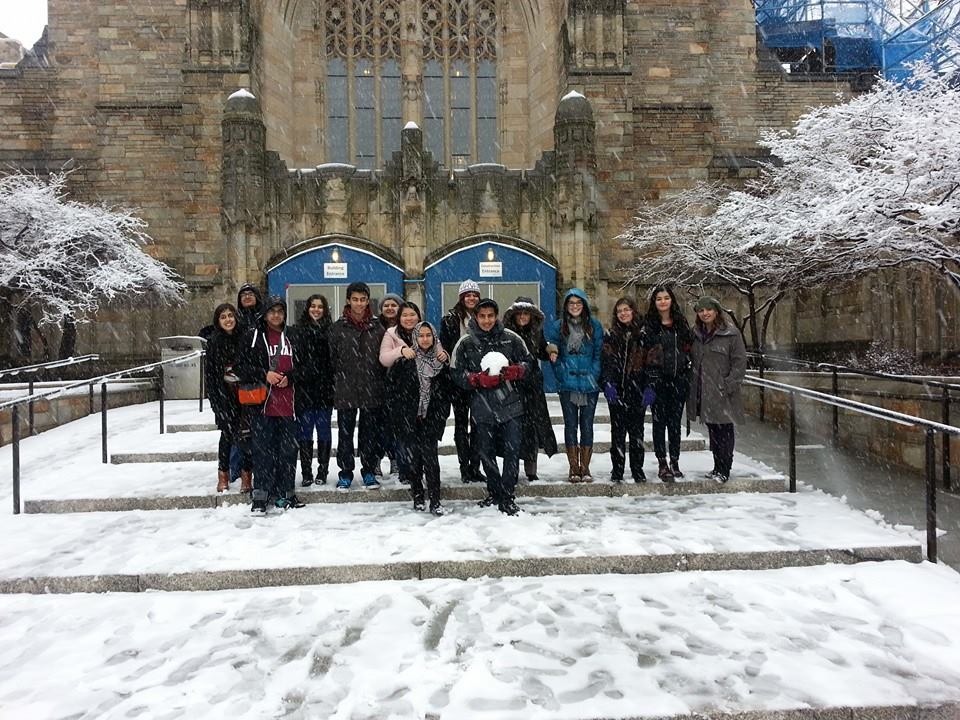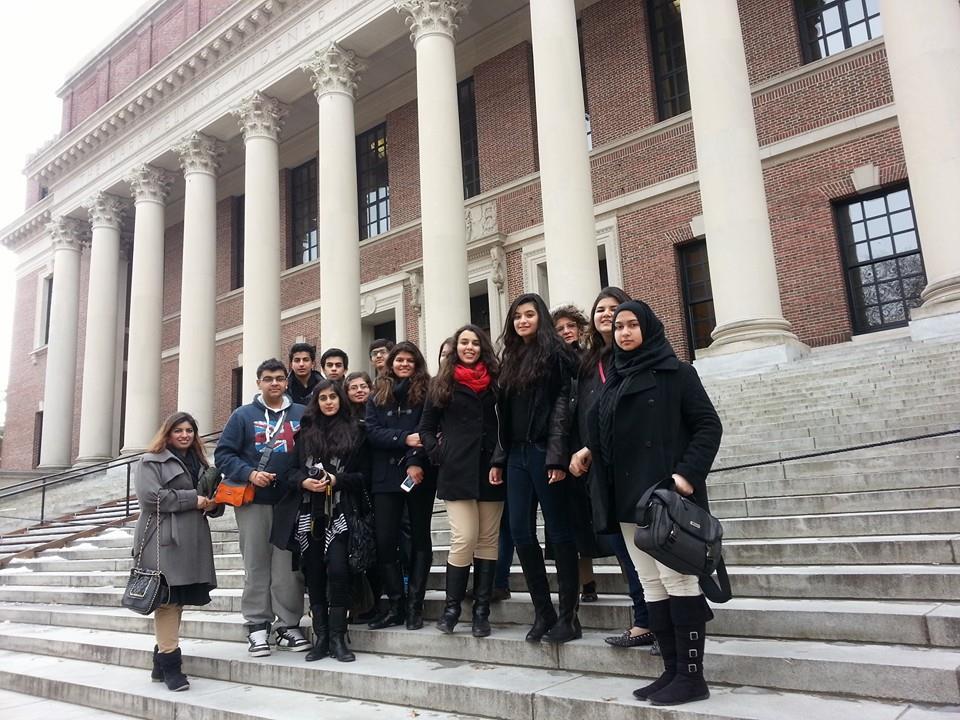Secondary Level
CLASSES IX & X
Conscious of the importance of continuity in education, PSI decided in the year 2000 to upgrade the school to class IX and X to include ‘O’ Levels. The course of studies follows the University of Cambridge syllabus and prepares the student to take the ‘O’ Level Examinations in two years time. The two-year time frame may be extended by another year if a student is not able to meet academic standard for the examination.
A highly inter-active approach to learning is encouraged in the classroom through discussion and group work complemented by regular written class and home assignments. In Sciences, the learning process is supported by investigation; experiment demonstrations in each discipline in the Lab.More subjects may be offered depending on the demand and the size of the group opting for a subject. However, the choice of subjects will have to conform to combination set by the school.
In addition to learning facts, logical thinking is encouraged through inquiry and problem solving. Assessment is continuous and built in over the two year period.
Students are provided with an opportunity to help at in a primary classroom setting and encouraged to display their leadership qualities in school and community related activities.


Subjects for Secondary Level
Literature in English (2010)
This syllabus enables learners to read, interpret and evaluate texts through the study of literature in English. Learners develop an understanding of literal meaning, relevant contexts and of the deeper themes or attitudes that may be expressed. Through their studies, they learn to recognise and appreciate the ways in which writers use English to achieve a range of effects, and will be able to present an informed, personal response to the material they have studied. The syllabus also encourages the exploration of wider and universal issues, promoting learners' better understanding of themselves and of the world around them.
English Language (1123)
The Cambridge O Level English Language syllabus enables learners to communicate accurately, appropriately and effectively and to understand and respond appropriately and imaginatively to what they read and experience. They will employ different forms of writing to suit a range of purposes and will show that they can understand the content and argument of given texts.
Mathematics D (4024)
An essential subject for all learners, Cambridge O Level Mathematics encourages the development of mathematical knowledge as a key life skill, and as a basis for more advanced study. The syllabus aims to build learners' confidence by helping them develop a feel for numbers, patterns and relationships, and places a strong emphasis on solving problems and presenting and interpreting results. Learners gain an understanding of how to communicate and reason using mathematical concepts, and the syllabus also ensures learners are confident in the use of a calculator, as this can be used in the final exam.
Additional Mathematics (4037)
This syllabus is intended for high ability learners who have achieved, or are likely to achieve, a high grade in the Cambridge O Level Mathematics examination. The Cambridge O Level Additional Mathematics syllabus enables learners to extend the mathematical skills, knowledge and understanding developed in the Cambridge O Level Mathematics course and use skills in the context of more advanced techniques. The syllabus has a Pure Mathematics only content which enables learners to acquire a suitable foundation in mathematics for further study in the subject. Knowledge of the content of the Cambridge O Level Mathematics syllabus (or an equivalent syllabus) is assumed.
Physics (5054)
The Cambridge O Level Physics syllabus helps learners to understand the technological world in which they live, and take an informed interest in science and scientific developments. Learners gain an understanding of the basic principles of physics through a mix of theoretical and practical studies. They also develop an understanding of the scientific skills essential for further study at Cambridge International AS and A Level, which are useful in everyday life. As they progress, learners gain an understanding of how science is studied and practised, and become aware that the results of scientific research can have both good and bad effects on individuals, communities and the environment.
Chemistry (5070)
The Cambridge O Level Chemistry syllabus helps learners to understand the technological world in which they live, and take an informed interest in science and scientific developments. They learn about the basic principles of chemistry through a mix of theoretical and practical studies. Learners also develop an understanding of the scientific skills essential for further study at Cambridge International A Level, skills which are useful in everyday life. As they progress, learners gain an understanding of how science is studied and practised, and become aware that the results of scientific research can have both good and bad effects on individuals, communities and the environment.
Biology (5090)
With an emphasis on human biology, the Cambridge O Level Biology syllabus enables learners to understand the technological world in which they live, and take an informed interest in science and scientific developments. Learners gain an understanding of the basic principles of biology through a mix of theoretical and practical studies. They also develop an understanding of the scientific skills essential for further study at Cambridge International A Level, skills which are useful in everyday life. As they progress, learners understand how science is studied and practised, and become aware that the results of scientific research can have both good and bad effects on individuals, communities and the environment.
Principle of Accounts (7110)
The syllabus covers basic principles of accounting, developing both a knowledge of the subject and encouraging understanding, analysis and evaluation. Learners cover topics such as double-entry bookkeeping, the cash book, general journal and ledger, and how to make a trial balance. Learners also consider issues such as capital and revenue expenditure, adjustments to ledger accounts, the correction of errors, control accounts, and the purchase of a business. The syllabus is wide-ranging and also covers topics such as balance sheets, the operation of partnerships, selected ratios and the preparation of final accounts.
Economics (2281)
The Cambridge O Level Economics syllabus develops an understanding of economic terminology and principles, and of basic economic theory. Learners find out about the economics of developed and developing nations and how these interrelate. They will also learn to handle simple data and undertake economic analysis, evaluate information and discriminate between facts and value judgements in economic issues. A foundation for further study at Cambridge International AS and A Level, the syllabus also encourages a better understanding of the world in which learners live, and helps them play an active part in the decision-making process, whether as consumers, producers or citizens of the local, national and international community.
Business Studies (7115)
Learners consider a range of stakeholder perspectives, from the individual to national government, when studying the Cambridge O Level Business Studies syllabus. As a result, they learn about the major groups in and outside the business community, and consider how they are able to influence objectives, decisions and activities. Learners also understand the importance of innovation and change. The syllabus introduces learners to relevant terminology, concepts and methods, while also developing broader skills of literacy, numeracy and enquiry. They also learn how to research and interpret information from a variety of sources, in order to build arguments and make informed judgements.
Urdu Language (3248)
Cambridge O Level Second Language Urdu is designed for learners who already have a working knowledge of the language and who want to consolidate their understanding to progress in their academic or professional careers. The qualification reflects the widespread use of Urdu in education and commerce. Through their studies, learners will gain an understanding of how to use Urdu effectively in the type of situations, and Urdu-speaking environments, they will encounter in their daily lives. The aim is to achieve a level of practical communication ideal for everyday use, which can also form the basis for further, more in-depth language study.
Islamiyat (2058)
This syllabus enables learners to develop an understanding of the importance of the major beliefs of Islam, and of the early history of the Islamic community. As a result, learners develop their knowledge and understanding of the main elements of Islamic faith and history, evaluating the meaning and importance of these elements in the lives and thoughts of Muslims. Although the syllabus is studied in English, some familiarity with passages from the Qur'an and Hadith in Arabic is assumed.
Pakistan Studies (2059)
The Cambridge O Level Pakistan Studies syllabus introduces learners to the history, culture, geography, environment and development of Pakistan. They learn about Pakistan's rich heritage and cultural influences, and about the events which have shaped national identity, from the decline of Mughal power up to 1999. Through their studies, learners gain an understanding of historical skills and concepts, and examine different interpretations of historical events. They also consider the geography of Pakistan and the environmental and development issues facing the country. This will encourage a better understanding of the interaction between economy and environment, an understanding enhanced by the study of different source materials and perspectives. This syllabus gives all learners an appreciation of the heritage, the challenges and opportunities facing Pakistan.
Art & Design (6090)
Cambridge O Level Art will be examined for the last time in November 2014. Schools in Pakistan, Bangladesh, Maldives and Mauritius will be able to enter students for the new 6090 Cambridge O Level Art and Design from June 2015. Brunei schools can enter candidates 6089 O Level Art and Design. Schools in other countries are advised to enter students for 0400 Cambridge IGCSE Art and Design, a popular course with schools worldwide, providing students with an ideal foundation for further study.
*French (3015)
Cambridge O Level French is designed for learners who already have a working knowledge of the language and who want to consolidate, and develop further, their understanding in order to progress in their academic or professional career. They will learn how to use French effectively in the type of situations, and French-speaking environments, that they will encounter in their daily lives. The aim is to enable learners to achieve greater fluency, accuracy and confidence in the written language and to achieve a level of practical communication which can also form the basis for further, more in-depth language study.
*Computer Science (2210)
Learners following the Cambridge O Level Computer Science syllabus develop their understanding of the main principles of problem solving using computers. They can apply their understanding to develop computer-based solutions to problems using algorithms and a high-level programming language. Learners also develop a range of technical skills, as well as being able to effectively test and evaluate computing solutions. Studying Cambridge IGCSE Computer Science will help learners appreciate current and emerging computing technologies, the benefits of their use and recognise their potential risks. Cambridge O Level Computer Studies helps learners develop an interest in computing and gain confidence in computational thinking. It is an ideal foundation for further study at Cambridge International AS and A Level, and the skills learnt can also be used in other areas of study and in everyday life. From the 2015 examination series, this syllabus will replace Cambridge O Level Computer Studies (syllabus code 7010).

